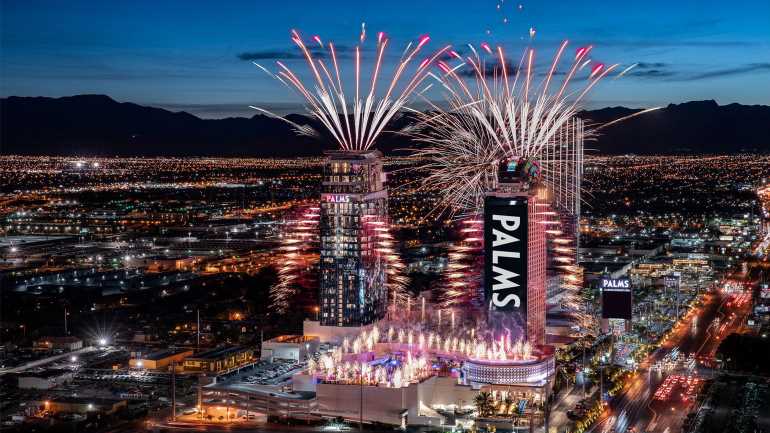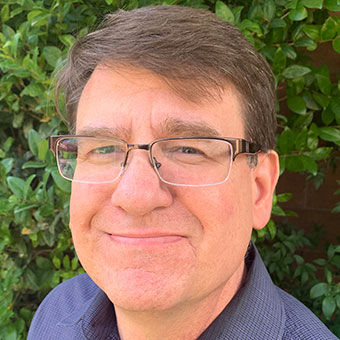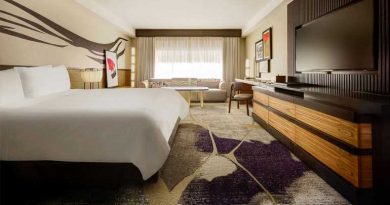Tribal influence in Vegas grows with upcoming Palms reopening
Closed since the pandemic’s onset in March 2020 and under new tribal ownership, the Palms Casino Resort in Las Vegas is expected to open in the spring.
The Nevada Gaming Commission cleared the way Dec. 16 for the San Manuel Gaming and Hospitality Authority to assume ownership of the off-Strip resort. The tribe announced in May that it was buying the property from Red Rock Resorts (formerly Station Casinos) for $650 million in cash.
“We are grateful for this opportunity to share our long-standing tradition of hospitality with Las Vegas and execute our vision for this iconic resort, starting by welcoming back former and current Palms employees,” San Manuel Gaming chairwoman Latisha Casas said. “Together, we will create history.”
In addition to the casino, the Palms features more than 700 hotel rooms and suites, several dining venues, meetings space, a 2,500-seat theater, pool, spa and Palms Place condominiums. Guests can now make reservations at Palms Place. Room reservations for the Palms Casino Resort will be available early next year.
Tribal influence in Vegas deepens
San Manuel becomes the first Native American tribe to own and operate a casino-resort in Las Vegas. Mohegan Gaming & Entertainment operates the casino at Virgin Hotels Las Vegas, and the Seminole Tribe of Florida’s Hard Rock International announced earlier this month it was acquiring the Mirage in a deal to be completed in 2022.
“The tribal gaming industry is hugely successful,” said Alan Feldman, a casino industry veteran who is now a distinguished fellow in responsible gaming for the International Gaming Institute at the University of Nevada, Las Vegas. “They generate a lot of [capital], and obviously they’ve done some incredibly wonderful things on tribal lands to improve the lives of tribal communities all across the country.”
Part of ensuring continued success for future generations means making more investments, on and off tribal lands, Feldman said. San Manuel undoubtedly found a unique opportunity at the Palms, which underwent a $620 million renovation before the pandemic.
“Palms is a particularly strategic investment,” Feldman said. “This is a property that just had an enormous amount of investment poured into it. And they picked it up for very much what [most would think] was below market value, considering how much had just been spent on it — a great value for them.”
The tribe also owns and operates Yaamava’ Resort & Casino at San Manuel (formerly San Manuel Casino), in Highland, Calif., about 90 minutes east of Los Angeles. The debut of a 2,800-seat entertainment venue will complete an expansion next year.
“I don’t think for a second anyone should doubt the marketing prowess of this particular group or, frankly, any group in tribal gaming,” Feldman said. “Some of the most beautiful casinos in the country are on tribal lands run by tribal entities. San Manuel may be one of the best examples.”
Cynthia Kiser Murphey, a former MGM Resorts International executive who was named general manager in the fall, said, “It’s important we bring forward the strong values and culture of the tribe into everything we do at the property.”
What can guests expect on a Palms stay?
While specific changes for the Palms have not been announced, Feldman said guests may enjoy more personal service.
“San Manuel is a very good example of a tribe that is incredibly sensitive about its culture and its history,” Feldman said. “Part of that is an expression of its care and compassion about everything — about its people, about its community, about its land. And I think that extends to their customer in a different way than when a commercial company says [it] cares about [its] customers.”
How that difference manifests at the Palms remains to be seen.
Feldman said San Manuel doesn’t have “that kind of breakneck pressure that you see in many [commercial] companies to make the quarter, to drive business, to acquire customers, to outmarket everyone. What we may end up seeing in San Manuel … may have more to do with developing and nurturing relationships with customers.”
“New money coming into Las Vegas has always been good,” Feldman said. “It’s great to have them in town, great to have them in this competition for everyone else and great to see them competing with everyone else.”
Source: Read Full Article




